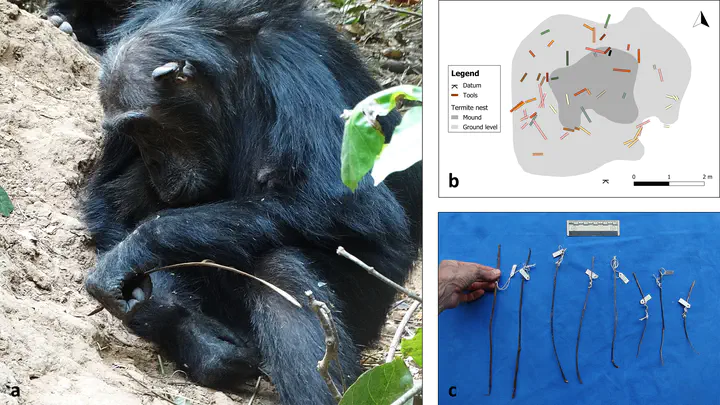Archaeology of the Perishable
 Image credit: K. Almeida-Warren & A. Pascual-Garrido
Image credit: K. Almeida-Warren & A. Pascual-GarridoOur understanding of how human material culture evolved is biased towards lithic technology. This is largely because stone tools are more likely to survive over time, but also because we know little about the archaeological signatures that plant-based artefacts may leave in the environment. Nevertheless, given the prevalence of plant-based technologies among chimpanzees and human non-industrialized societies, it is widely accepted that plant materials featured prominently in the technological toolkit of our ancestors, even before the emergence of stone tool use and perhaps as far back as the chimpanzee-human last common ancestor.
This project, established and led by Dr. Alejandra Pascual-Garrido, delves into the archaeology of chimpanzee termite fishing, to uncover the archaeological traces of plant-based technology, and gain insights into the cognitive, technical, and behavioural precursors of stone tool use. I have been a collaborator on this project since 2015, having contributed towards several key areas of research:
- Selection and transport of plant materials
- Strategies of raw material acquisition
- Site formation processes and preservation of material remains
- Techno-cultural variation
Even in its infancy, the Archaeology of the Perishable has revealed that:
- Chimpanzees select particular plant species and tool materials for tool manufacture, perhaps because of especially suited physical properties;
- In drier and more open environments, chimpanzees travel almost double the distance to source raw material;
- The sourcing of raw materials leaves ‘scars’ on source plants which can provide rich information about past behaviour;
- Tool-use features in neighbouring communities differ, suggesting cultural preferences.
Taken as a whole, our research denotes that the strategies employed in the sourcing and selection of raw materials for termite-fishing tools resemble those associated to early Oldowan industries, suggesting that behaviours associated with stone tool use may have an even earlier origin than previously thought.